Today marked the final day of the conference side of Beyond the Music. Over the last two days, 2000-plus delegates have been in Manchester to discuss the future of the music industry, all while giving a platform to grassroots artists from across the UK and beyond.

We kick off our third day at the ‘The Morning After’ Networking event hosted by Music Managers Forum, giving everyone a hearty breakfast after a night full of gigs, shows and performances across the Northern Quarter.
An Introduction from Cooperative’s CEO Rose Marley.
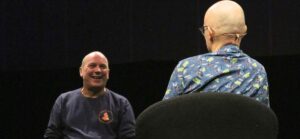
The first speaking event was hosted by IVOR NOVELLO award-winning, GRAMMY®, and BAFTA-nominated composer Richard Jacques, whose credits include Marvel’s Guardians Of The Galaxy, EA’s Mass Effect, and Sony’s Little Big Planet 2, where he discussed his career and the intrinsic and changing nature of music in today’s video game landscape and how synergy between the gaming and music industries is key.
This was followed by ‘’Building Partnerships To Improve Music Industry Mental Health’’ Led by Headstock founder, Atheer Al-Salim, who sat down with BBC 6 Music’s Chris Hawkins to discuss the importance of partnerships when it comes to tackling mental health in the music industry.
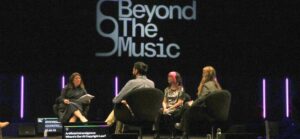
In the South Warehouse in Aviva Studios, the AI summit took place and all things copyright, legal and AI-related were discussed by experts debating on what needs to be done to secure creative’s intellectual property – and what legislation/regulation should look like. Joined by panellists from organisations like PRS, IFPI, CISAC, Life Score Music and Reed Smith.
Anna Neale (CISAC) said ‘AI has been successfully integrated into many musicians processes and wider music services. However, it’s important to protect human creativity, creator’s copyright and to encourage transparency from AI providers”
”It’s a global issue as many countries don’t agree on the level of copyright infringement caused by AI and UK laws and licences can be bypassed”
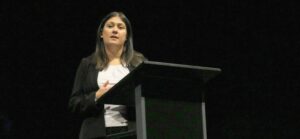
After lunch, was the Tony Wilson Keynote where Lisa Nandy MP, the Secretary of State for Culture, Media and Sport spoke to the delegation. Her key topics include the history of Manchester’s musical contributions, how we can harness Mancunian talent and what we can do to move forward. She went on to say:
‘In the last decade, creativity has been stripped from our schools and youth. We are determined to nurture this talent, creating an environment that encourages this generation to find the arts’
‘Music is a labour of love, and labour should be paid for fairly. Music is a universal language, and the world needs to hear it now more than ever’
When asked what the government have planned to support Manchester’s music scene, Lisa said:
‘The government plans start with utilising community assets, with processes like the community right to buy. We plan to extend the time it takes for dunding to be collected and opening the opportunity for further government funding for venues at risk of closure’
‘We’re also looking at working with sports clubs, to further utilise their assets and services to extend them to more of the community’
The afternoon saw demonstrations of the latest interactive audio product LifeScore, the world’s first parametric audio creation technology for professional artists and musicians. Followed by Gameopolis launch and Cross Content Sector Mixer.
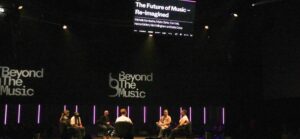
Later in the day, the panel ‘The Future Of Music – Re-Imagined’ kicked off the conversation around what will the music industry look like 20 years into the future. With a range of panellists from artist Tom Vek, Isatta Cesay (Island Records), Tom Frith MP, Michelle Kambasha (KP Communications), Myles Clarke (Dolby), Hanna Kahlert (Midia Research) and Nick Fellingham (Condense Live).
When discussing the future of music when it comes to AI, Tom Vek said ‘I think musicians that are doing it for the right reasons won’t feel the negative affects of AI or future technology as they’ll embrace it. You can’t take the human out of the process and the intimate connection to art that comes from it’’
Nick Fellingham (Condense Live) said ‘Streamed live events are a big priority for us and we believe it’ll revolutionise live events, it will give better accessibility to a community otherwise unable to experience the magic of attending a live event while not affecting it for people can still attend it in person’
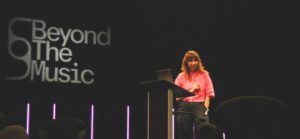
This was followed by a discussion on A Green Bill Of Health, an industry update on the progress of the Music Climate Pact from the leader, Roxy Erickson. She discussed the relationship between music and the climate crisis and updated the audience on what larger corporations are doing to combat climate change
She said ‘Coming together is the beginning, staying together is progress and working together is success’
‘Carbon literacy has to extend through the industry, in label and digital to live shows and the carbon footprint it creates. Many of the big three labels have already established their targets and are putting policies in place to minimise their effects’
Later that day, MTUK curated an event to address the current challenges within the live music industry and explore technological innovations that offer potential solutions. Focussed on enhancing live music experiences through advanced tech, focusing on various areas including improving event management and the creation of immersive experiences.
The conference then closed with networking drinks before day two of the Northern Quarter shows kicked off later that evening. We managed to attend four shows that evening. Our Friday night started at Soup, before moving on to Gullivers, Disorder before finishing at 33 Oldham Street. For a more in-depth look into the artists coming out of Greater Manchester, you can read more on Visit Manchester’s Unmissable Music.
As the final day of Beyond the Music comes to a close, it’s clear that this festival has not only inspired but has also ignited action on some of the most pressing issues facing the music industry today. Over the past few days, we’ve witnessed powerful discussions, formed new connections, and explored innovative solutions—all with a shared vision of building a more resilient, inclusive, and vibrant music ecosystem.

